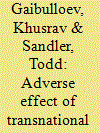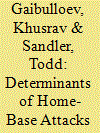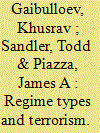|
|
|
Sort Order |
|
|
|
Items / Page
|
|
|
|
|
|
|
| Srl | Item |
| 1 |
ID:
106026


|
|
|
|
|
| Publication |
2011.
|
| Summary/Abstract |
This article investigates the adverse effects of domestic and transnational terrorism on income per capita growth for 51 African countries for 1970-2007, while accounting for cross-sectional (spatial) dependence and conflict (i.e. internal conflicts and external wars). The findings of the fixed-effects panel estimator suggest that transnational terrorism has a significant, but modest, marginal impact on income per capita growth. These results hold for two different terrorism event datasets. However, domestic terrorist events do not affect income per capita growth. Our findings differ from those in an earlier study on the impact of transnational terrorism on African growth, because we uncover a much more moderate effect. In our study, regional impacts and terrorism-conflict interactions effects are also distinguished. Moreover, our sample countries and period are more extensive. Our article contains a host of robustness checks involving macroeconomic and political variables that find virtually identical results. Alternative terrorist variables are also used, with little qualitative change in the findings. The absence of a domestic terrorism impact is surprising because there were many more domestic than transnational terrorist incidents in Africa. To promote growth, host and donor countries must direct scarce counter-terrorism resources to protect against transnational terrorism in particular. The modest impact of transnational terrorism on African growth means that developing countries' economies have been more resilient to terrorism than has been generally thought.
|
|
|
|
|
|
|
|
|
|
|
|
|
|
|
|
| 2 |
ID:
172140


|
|
|
|
|
| Summary/Abstract |
Keeping with the established tradition in our journal, this paper reviews and surveys the last decade, that is volumes 21–30. It offers an overview of the thematic coverage of the papers published in Defence and Peace Economics and the changes that have occurred, points to existing gaps in the defence economics literature and possible future directions in the research agenda of this growing and vibrant field.
|
|
|
|
|
|
|
|
|
|
|
|
|
|
|
|
| 3 |
ID:
182537


|
|
|
|
|
| Summary/Abstract |
Are terrorist groups with multiple home bases more or less predisposed to direct their violence at home or abroad? Moreover, what are the determinants of home-base terrorist attacks? We address those and related questions using the Extended Data on Terrorist Groups for 1970–2016. In so doing, we find that religious terrorist groups are less inclined than groups with other ideologies to conduct home-base attacks. In addition, multi-base terrorist groups are more apt to attack within their base country or countries after, but not before, 1990. In addition, our empirics indicate that terrorist groups with an empire goal are more inclined to attack outside their home base than groups possessing other goals (e.g., policy change or territorial ambitions). Democracy encourages home-base terrorist attacks.
|
|
|
|
|
|
|
|
|
|
|
|
|
|
|
|
| 4 |
ID:
106024


|
|
|
|
|
| Publication |
2011.
|
| Summary/Abstract |
This article devises a method to separate the Global Terrorism Database (GTD) into transnational and domestic terrorist incidents. This decomposition is essential for the understanding of some terrorism phenomena when the two types of terrorism are hypothesized to have different impacts. For example, transnational terrorism may have a greater adverse effect than domestic terrorism on economic growth. Moreover, the causes of the two types of terrorism may differ. Once the data are separated, we apply a calibration method to address some issues with GTD data - namely, the missing data for 1993 and different coding procedures used before 1998. In particular, we calibrate the GTD transnational terrorist incidents to ITERATE transnational terrorist incidents to address GTD's undercounting of incidents in much of the 1970s and its overcounting of incidents in much of the 1990s. Given our assumption that analogous errors characterize domestic terrorist events in GTD, we apply the same calibrations to adjust GTD domestic incidents. The second part of the article investigates the dynamic aspects of GTD domestic and transnational terrorist incidents, based on the calibrated data. Contemporaneous and lagged cross-correlations for the two types of terrorist incidents are computed for component time series involving casualties, deaths, assassinations, bombings, and armed attacks. We find a large cross-correlation between domestic and transnational terrorist incidents that persists over a number of periods. A key finding is that shocks to domestic terrorism result in persistent effects on transnational terrorism; however, the reverse is not true. This finding suggests that domestic terrorism can spill over to transnational terrorism, so that prime-target countries cannot ignore domestic terrorism abroad and may need to assist in curbing this homegrown terrorism.
|
|
|
|
|
|
|
|
|
|
|
|
|
|
|
|
| 5 |
ID:
093084


|
|
|
|
|
| Publication |
2009.
|
| Summary/Abstract |
This article investigates the determinants of logistical and negotiation success from the terrorists' viewpoint in hostage-taking missions. Logistical success indicates that the terrorists apparently completed the mission as planned, while negotiation success means that the terrorists received some of their initial demands. In the empirical analysis, the article utilizes a new dataset on hostage incidents from 1978 through 2005 for the logit regressions. Empirical results broadly support the authors' theoretical predictions. Logistical success depends positively on terrorist resources and target vulnerability, while negotiation success increases with the relative disagreement values and relative bargaining strengths of the terrorists. More specifically, terrorist success at the execution stage depends positively on kidnappings and large hostage grabs and varies negatively with attack force diversity and terrorist casualties. Negotiation success depends on bargaining variables (i.e. the number of hostages, casualties, incident duration, and other proxies). The article shows that the factors that determine terrorist negotiation success differ between kidnappings and non-kidnappings (i.e. skyjackings, the takeover of buildings, and the hijacking of non-aerial means of transport), owing to location and other considerations (e.g. types of demands). In particular, making multiple demands bolsters negotiated success in non-kidnappings, while demanding money fosters negotiated success in kidnappings. Lengthier incidents have a positive influence on the likelihood of terrorists gaining concessions in kidnappings and non-kidnappings.
|
|
|
|
|
|
|
|
|
|
|
|
|
|
|
|
| 6 |
ID:
182536


|
|
|
|
|
| Summary/Abstract |
This article introduces the contents of this special issue on terrorist groups. After some general remarks, we review essential concepts germane to the issue’s eight articles. Those concepts include the notion of terrorist groups and their alternative ideologies and goals. Differences between domestic and transnational terrorist attacks are briefly reviewed along with time-series plots of such attacks during 1970–2019. Other plots compare and contrast leftist and religious fundamentalist terrorist groups based on their number of attacks and active groups during 1970–2016. The introduction is devoted mainly to highlighting the individual articles and their contributions.
|
|
|
|
|
|
|
|
|
|
|
|
|
|
|
|
| 7 |
ID:
142040


|
|
|
|
|
| Summary/Abstract |
Based on spatial panel regressions for 1990–2012, this article draws publicness differences between peacekeeping personnel contributions to UN and non-UN peacekeeping operations. The analysis shows that UN missions are much less responsive to personnel spillovers, derived from other contributors’ peacekeepers, than is the case of non-UN missions. UN peacekeeping missions display either no response or free riding to these personnel spillovers, while non-UN missions indicate spillover complementarity. Moreover, a number of controls distinguish the two kinds of peacekeeping, where non-UN missions display income normality and UN missions’ deployments increase with the number of concurrent peacekeeping missions. The latter suggests that some countries specialize in supplying UN peacekeepers as a money-making venture. The positive response to the population variable supports this conjecture for UN missions, because a greater population base provides the recruits for peacekeeping operations. Our spatial empirical analysis accounts for the endogeneity of peacekeeper spillovers. The article concludes with a host of robustness tests that account for the alternative classes of peacekeepers, African Union and ECOWAS missions, and other empirical variants.
|
|
|
|
|
|
|
|
|
|
|
|
|
|
|
|
| 8 |
ID:
154542


|
|
|
|
|
| Summary/Abstract |
Regime type has opposing effects on terrorism. If a regime constrains the executive branch, then terrorism may be more prevalent. If, however, a regime allows all viewpoints to be represented, then grievances may be held in check, resulting in less terrorism. Regimes that value constituents’ lives and property will also act to limit attacks. We formulate a game-theoretic model, containing a terrorist group and targeted government, that captures these opposing forces and supports a nonlinear relationship between regime type and terrorism. This model indicates how diverse samples in the literature can result in different relationships between regime type and terrorism. Seldom does it support the positive relationship that is prevalent in the terrorism literature. We apply a large variety of empirical techniques to show that regime type has a robust inverted U-shaped impact on various terrorism measures. Foreign policy variables (e.g., alliance with the United States) are not a robust influence on terrorism.
|
|
|
|
|
|
|
|
|
|
|
|
|
|
|
|
|
|
|
|
|